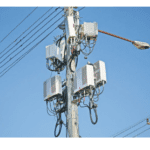By Leslie Stimson, Inside Towers Washington Bureau Chief

American Tower Corporation CEO Jim Taiclet, led a small delegation to speak with Commissioners Michael O’Rielly and Jessica Rosenworcel and their staffs last week. Taiclet discussed the role that macro towers will continue to play in the future deployment of 5G, according to a filing describing the meeting. He spoke about the company’s work with communities on siting and hopes the agency will strike the right balance between streamlining local reviews and reducing siting costs while preserving localities’ right to “reasonably” protect land use values. Taiclet included photos of small cell deployments about which localities “may be legitimately concerned,” and stressed the importance of a shared tower model available for use by all providers.
Crown Castle, meanwhile, urged the agency to act swiftly to use its authority over localities to streamline small cell infrastructure siting and says it has the authority to do so. The towerco says it’s worked cooperatively with many jurisdictions and successfully deployed small cell networks in hundreds of places, taking advantage of densification to boost network capacity and throughput.
But some jurisdictions have created obstacles to siting in their public Rights-of-Way (ROW), asserts Crown Castle. “A number of jurisdictions impose unreasonable fees and conditions on wireless facilities that are particularly inappropriate in the context of small cells, which are a fraction of the size of macro towers and typically have minimal impact on the surrounding area,” it tells the Commission. Such fees make deploying networks cost-prohibitive and consume capital and revenue that could otherwise be used to expand wireless infrastructure in high-cost areas, it says.
Other localities apply one set of rules and fees for wireline facilities in ROWS, while charging wireless companies more and holding their infrastructure to a higher standard, according to Crown Castle. “In some cases, municipalities have unjustifiably prohibited installations of equipment to facilitate wireless telecommunications or imposed moratoria that have the effect of prohibiting wireless small cell installations in the public ROW. These are the simplest and most direct forms of prohibition.”
Published June 12




Reader Interactions